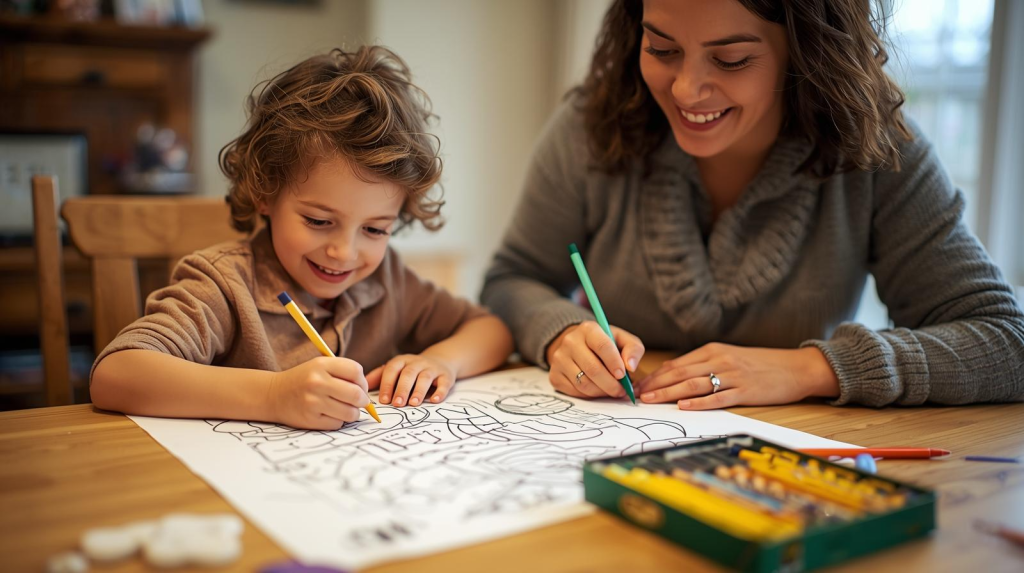A heartfelt reflection on the unexpected parenting lessons learned from children, showcasing growth and deeper connections.

Parenting is often seen as a one-way street where adults guide children, but sometimes the roles reverse. This week, my child offered insights that reshaped my understanding of parenting. Through simple moments, I learned about patience, empathy, and the beauty of living in the present. These lessons, though small, have a profound impact on how I approach my role as a parent.
Key Takeaway
- Children teach parents about patience and understanding.
- Embracing spontaneity can strengthen the parent-child bond.
- Authenticity in parenting fosters deeper connections.
The Unexpected Teacher

A Lesson in Patience
It’s funny how life works. One moment, you’re the teacher, and the next, you’re the student. This week, my child reminded me of the importance of patience. It was a typical Saturday morning, and I had plans to clean the house. But my child had other ideas. With a box of crayons and a blank sheet of paper, they wanted to create a masterpiece.
At first, I felt the urge to rush them along, to get back to my chores. But then I paused. I remembered the joy of creating without a deadline. So, I sat down and joined in. As we colored together, I realized that this moment was more valuable than any clean room. It was a lesson in slowing down, in appreciating the process rather than just the outcome.
Embracing Spontaneity
The Joy of Unexpected Adventures
Another lesson came unexpectedly during a trip to the grocery store. My child spotted a balloon vendor outside. Instead of sticking to our shopping list, they tugged at my sleeve, eyes wide with excitement. I hesitated. We had a schedule, after all. But their enthusiasm was contagious.
We bought a balloon, and for the rest of the day, it became a symbol of joy. We laughed, played, and even took silly pictures with it. This spontaneous decision turned an ordinary errand into a memorable adventure. It reminded me that sometimes, the best moments in parenting come from breaking the routine and embracing the unexpected.
The Power of Authenticity
Throughout the week, I also learned about the importance of being authentic. During a quiet evening, my child asked me why I sometimes seemed stressed. I hesitated, unsure of how to respond. But then I realized that honesty is crucial in our relationship. So, I shared my feelings, explaining that sometimes, adult responsibilities can be overwhelming.
To my surprise, my child listened intently. They offered a simple yet profound piece of advice: “Just breathe, Mom.” It was a reminder that vulnerability can strengthen our bond. By being open about my struggles, I showed my child that it’s okay to feel overwhelmed sometimes. This authenticity fosters trust and understanding, creating a safe space for both of us to express our emotions.
Learning from Behavior
Children have a unique way of teaching parents through their behavior. This week, I noticed how my child approached a conflict with a friend. Instead of retaliating, they chose to talk it out. They expressed their feelings calmly and listened to their friend’s perspective.
This moment was a powerful reflection of how I handle conflicts in my own life. I realized that I often let frustration dictate my responses. Watching my child navigate this situation reminded me of the importance of communication and empathy. It’s a lesson I aim to carry forward, not just in parenting but in all my relationships.
Building Stronger Bonds
As the week progressed, I found myself reflecting on the lessons learned. Each moment, whether it was coloring, buying a balloon, or discussing feelings, contributed to a deeper understanding of my child and myself. These experiences highlighted the significance of building stronger bonds through shared moments and open communication.
The child-parent relationship is a two-way street. While parents guide their children, children also offer invaluable insights that can lead to personal growth. This mutual learning creates a dynamic where both parties evolve together.
Parenting Challenges and Rewards
Credits: Sprouts
Of course, parenting isn’t always easy. There are challenges that can feel overwhelming. There are days when patience runs thin, and the chaos of life can be exhausting. But amidst these challenges, there are rewards that make it all worthwhile.
This week, I was reminded that the small moments often hold the greatest significance. They are the building blocks of a strong relationship. By embracing the lessons my child teaches me, I find myself growing as a parent, learning to navigate the complexities of raising a child with love and understanding.
The Journey Continues
As I reflect on this week’s experiences, I realize that parenting is a continuous journey of growth and learning. Each day presents new opportunities to connect, to teach, and to learn. The insights gained from my child serve as a reminder that parenting is not just about guiding but also about being open to the lessons that come from our little ones.
Conclusion
The journey of parenting is ongoing, and each week brings new lessons. By being open to learning from our children, we can grow alongside them, creating a nurturing environment where both parent and child flourish. As you navigate your own parenting journey, remember to cherish the small moments—they often hold the most profound lessons. Embrace the chaos, celebrate the victories, and let your child be your guide as you both learn and grow together.
FAQ
How can my child possibly teach me anything when I’m supposed to be the parent?
Parenting is actually a two-way relationship, not a one-way street. While you guide your child through life, they offer fresh perspectives and remind you of things you may have forgotten—like the joy of living in the moment or the power of simple honesty. Children aren’t burdened by the same worries and schedules adults carry, so they naturally approach life with curiosity and authenticity. Being open to these lessons doesn’t diminish your role as a parent; it enriches it and helps you grow alongside your child.
I always feel guilty when I choose my to-do list over spending time with my child. How do I find balance?
That guilt is completely normal, and it shows you care. The key is recognizing that not every chore needs to be done immediately, and some moments with your child are irreplaceable. Try asking yourself: “Will I remember this task in five years, or will I remember this moment with my child?” Sometimes the messy house can wait while you color together or play. Balance doesn’t mean choosing your child every single time—it means being intentional about when you prioritize connection over tasks.
What if I don’t feel comfortable being vulnerable or sharing my stress with my child?
It’s understandable to want to protect your child from adult worries. However, age-appropriate honesty can actually strengthen your bond. You don’t need to share every detail of your stress, but acknowledging that “Mom is feeling a bit overwhelmed today” teaches your child that emotions are normal and manageable. When you show vulnerability, you give your child permission to express their own feelings too. It creates a safe space for authentic communication and shows them that everyone struggles sometimes.
My child’s spontaneity disrupts our schedule constantly. How do I embrace it without losing all structure?
You don’t have to abandon all structure—that would create its own chaos. Instead, look for moments when flexibility won’t derail your entire day. Maybe you can’t buy the balloon and spend an hour playing with it on a busy weekday, but you could on a Saturday afternoon when your schedule is lighter. The goal is to occasionally say “yes” to spontaneity when it’s feasible, creating those memorable moments without sacrificing necessary routines. Even small breaks from routine can make a big difference.
I find myself getting frustrated and snapping at my child. How do I handle conflicts better?
First, give yourself grace—every parent loses their patience sometimes. Pay attention to how your child handles their own conflicts. Often, kids are better at expressing feelings calmly and listening to others than we give them credit for. When you notice yourself getting frustrated, try to pause and take a breath before responding. Later, reflect on what triggered your frustration and think about how you might respond differently next time. Like the article mentions, your child’s simple advice to “just breathe” can be surprisingly powerful.
What does it mean to be “present” with my child? I’m physically there, isn’t that enough?
Being present means giving your full attention, not just being in the same room. It’s putting down your phone, making eye contact, and genuinely engaging with whatever your child wants to share or do. When you sat down to color instead of rushing through chores, that was being present—you were mentally and emotionally engaged in that moment together. Even 15 minutes of truly present time can be more meaningful than hours of distracted coexistence.
My child seems fine handling things on their own. Do they really need me to learn from them?
Even independent children benefit from parents who are open to learning from them. Watching how your child navigates the world—whether it’s handling friendship conflicts, approaching new challenges, or finding joy in simple things—can offer valuable insights for your own life. It’s not that they need you to learn from them; it’s that you both benefit when you recognize the wisdom they naturally possess. This mutual respect deepens your connection and shows your child that you value their perspective.
How do I celebrate small moments without making everything feel forced or overly sentimental?
Small moments don’t need grand gestures or announcements. Celebrating them can be as simple as smiling and thinking “I’m glad we did this” or mentioning later “I really enjoyed coloring with you today.” It’s about internal recognition and occasionally expressing appreciation. You don’t need to document everything or make it a big deal—just notice when something feels meaningful and allow yourself to fully experience that feeling.
References
- https://www.unicef.org/parenting/child-care/what-you-need-know-about-parent-child-attachment
- https://positiveparenting.gov.mt/en/what-do-children-teach-us-parents-about-life/

